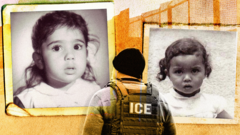Could American Adoptees Face Deportation to Unfamiliar Countries?

Published: 2025-10-31 01:00:21 | Category: world
Shirley Chung's experience highlights a troubling issue faced by many intercountry adoptees: the lack of US citizenship despite being raised as American. Born in South Korea and adopted by a US family, Shirley discovered her citizenship status was never secured, a reality affecting an estimated 18,000 to 75,000 adoptees. This article explores the implications of this oversight, the emotional toll on individuals like Shirley, and the ongoing efforts to rectify the situation through legislative changes.
Last updated: 30 October 2023 (BST)
What’s happening now
The plight of intercountry adoptees without US citizenship has gained renewed attention as advocacy groups and affected individuals push for legislative changes. The recent political climate, particularly under the Trump administration, has heightened fears of deportation among adoptees, many of whom are now grappling with uncertainty about their legal status. Concerns about immigration enforcement have led to increased requests for help from adoptees who feel vulnerable and at risk of being classified as illegal aliens.
Key takeaways
- Shirley Chung's journey illustrates the struggles of intercountry adoptees lacking US citizenship.
- Estimates suggest 18,000 to 75,000 American adoptees may not have citizenship.
- Legislation like the Child Citizenship Act of 2000 did not cover many existing adoptees.
- Recent political developments have intensified fears of deportation among adoptees.
- Advocacy groups are seeking to amend laws to ensure citizenship for all adoptees.
Timeline: how we got here
The issue of citizenship for intercountry adoptees has evolved over decades, with several key milestones:
- 1966: Shirley Chung is adopted by a US family, highlighting the beginning of many similar stories.
- 1983: The US government begins to address citizenship issues with international adoptees.
- 2000: The Child Citizenship Act passes, granting automatic citizenship to some international adoptees, but only those adopted after February 1983.
- 2012: Shirley discovers her lack of citizenship, prompting her advocacy for others in similar situations.
- 2017: Publicized cases of deportations among adoptees raise awareness of the issue.
- 2023: Advocacy efforts continue as political changes raise new concerns over immigration policies affecting adoptees.
What’s new vs what’s known
New today/this week
Recent reports indicate a surge in requests for assistance from adoptees fearing deportation, particularly following the political climate changes associated with the Trump administration. Advocacy groups are mobilising to push for legislative reforms that would secure citizenship for all adoptees, irrespective of their adoption date.
What was already established
It has long been recognised that not all intercountry adoptees automatically receive US citizenship. The Child Citizenship Act of 2000 was a significant step forward, but it left many adoptees without legal status. The ongoing struggles of individuals like Shirley Chung have highlighted the emotional and legal complexities that many adoptees face.
Impact for the UK
Consumers and households
While the issue primarily affects US adoptees, it has implications for UK households involved in international adoptions. Concerns over the legal status of adopted children may affect families' decisions to adopt or the support they seek from authorities. Increased awareness could lead to better policies that protect the rights of all adoptees.
Businesses and jobs
For businesses, the uncertainty surrounding the legal status of employees who are intercountry adoptees could impact hiring policies and workplace diversity initiatives. Companies may need to consider the implications of citizenship status on employee benefits and rights.
Policy and regulation
In the UK, policymakers may take cues from the US situation to ensure that adoption laws are comprehensive and protective of adoptees' rights. Increased scrutiny on immigration policies could foster discussions around citizenship for adopted individuals, ensuring that similar issues do not arise in the UK context.
Numbers that matter
- 18,000–75,000: Estimated number of American adoptees lacking US citizenship.
- 2000: Year the Child Citizenship Act was enacted, affecting future adoptees.
- 1 in 4: Ratio of adoptees who may face deportation due to lack of citizenship.
- 275: Number of requests for help received by the Adoptee Rights Law Center following recent political changes.
- 2-3: Average number of US citizen parents many adoptees have yet remain without citizenship themselves.
Definitions and jargon buster
- Intercountry adoptees: Children adopted from one country by parents in another country.
- Child Citizenship Act of 2000: US law granting automatic citizenship to certain foreign-born children adopted by US citizens.
- Adoptee Rights Law Center: An organisation advocating for the rights of adoptees, particularly related to citizenship issues.
How to think about the next steps
Near term (0–4 weeks)
Advocacy groups are likely to ramp up their campaigning efforts, potentially leading to new legislative proposals aimed at securing citizenship for all intercountry adoptees. Monitoring these developments will be crucial for affected individuals and families.
Medium term (1–6 months)
Continued pressure on Congress to amend existing laws could lead to hearings or discussions around the citizenship status of intercountry adoptees. Families may want to engage with local representatives to express their concerns and advocate for change.
Signals to watch
- Legislative bills introduced in Congress regarding adoptee citizenship.
- Public statements and actions taken by the Adoptee Rights Law Center.
- Changes in immigration enforcement policies affecting adoptees.
Practical guidance
Do
- Stay informed about changes in immigration laws that may affect adoptees.
- Engage with advocacy groups for support and resources.
- Document all adoption and immigration paperwork meticulously.
Don’t
- Assume that adoption guarantees citizenship; verify legal status.
- Ignore correspondence from immigration authorities.
- Neglect to seek legal advice if facing citizenship issues.
Checklist
- Verify your citizenship status and that of your adopted children.
- Keep all adoption and immigration documents in a secure location.
- Research and connect with local and national adoptee advocacy groups.
- Stay updated on legislative changes that could impact citizenship rights.
- Consider legal counsel for navigating complex immigration issues.
Risks, caveats, and uncertainties
The situation regarding citizenship for intercountry adoptees remains fluid, with ongoing legislative efforts facing political hurdles. The lack of clarity surrounding individual cases, coupled with varying state-level responses, means that many adoptees may continue to live in uncertainty. Additionally, recent political changes have heightened fears of immigration enforcement, complicating the landscape for those seeking citizenship rights.
Bottom line
The stories of individuals like Shirley Chung serve as a poignant reminder of the unresolved issues surrounding citizenship for intercountry adoptees. It is imperative for advocates and lawmakers to recognise these challenges and work towards comprehensive reforms that honour the promises made to these children. As the conversation continues, the hope remains that all adoptees will one day receive the citizenship they were promised.
FAQs
What is the current situation for intercountry adoptees in the US?
Many intercountry adoptees lack US citizenship due to incomplete legal processes during their adoption. Recent political changes have heightened fears of deportation among these individuals.
What legislative changes are being proposed for adoptee citizenship?
Advocacy groups are pushing for the amendment of the Child Citizenship Act to include all intercountry adoptees, irrespective of their adoption date, ensuring they receive citizenship rights.
How can adoptees protect their rights in the current political climate?
Adoptees should stay informed about their citizenship status, engage with advocacy groups, and seek legal counsel if necessary to navigate their rights and options.



